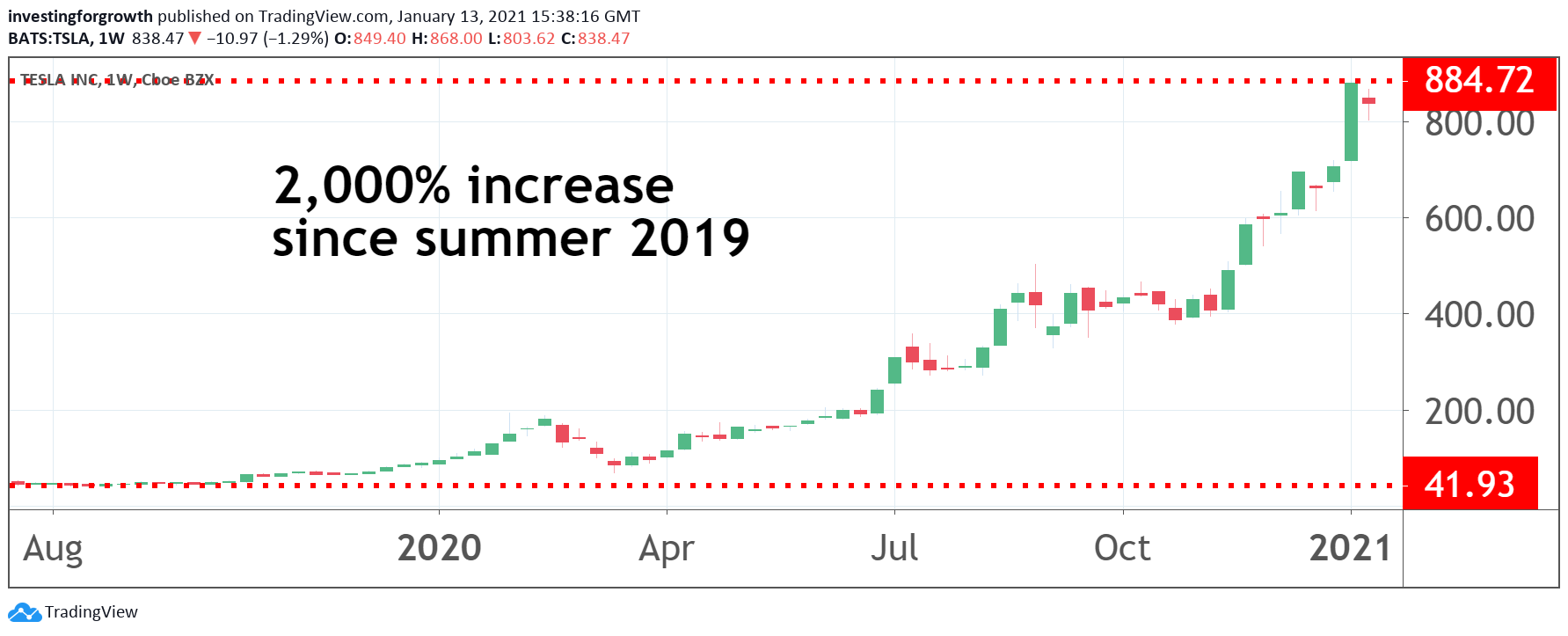Tesla: is Elon Musk’s vast fortune safe?
Recently crowned the world’s richest person thanks to Tesla, we discuss whether the shares are worth it.
14th January 2021 10:07
by Graeme Evans from interactive investor
Recently crowned the world’s richest person thanks to Tesla, we discuss whether the shares are worth it.

Elon Musk and Tesla (NASDAQ:TSLA) are continuing to defy the sceptics after a Bitcoin-style surge in the value of the electric car maker briefly made the tycoon the world's richest person.
In what's likely to have been the fastest case of wealth creation in history, Musk's net worth overtook that of Amazon.com (NASDAQ:AMZN) founder Jeff Bezos to reach more than $188 billion, after the value of his 20% stake in Tesla surged by more than 750% in the past year.
While an 8% slide in Tesla's value on Monday 11 January meant his spell at the top lasted only four days, few would bet against Musk holding the number one position over the longer term.
Many interactive investor clients have backed Musk for further success after Tesla was consistently among the most-bought US stocks on our platform through 2020.
- Baillie Gifford American: owning Tesla and more top stocks
- Tom Slater interview: Scottish Mortgage’s lockdown winners and new trends
- Be first to watch our star interviews. Just subscribe to our YouTube channel here.
At the other end of the investor spectrum, Baillie Gifford fund managers James Anderson and Tom Slater continue to hold more than 12% of the FTSE 100-listed Scottish Mortgage investment trust (LSE:SMT) in Tesla, a stake now worth more than £2 billion.
Tesla fanned investor enthusiasm on 2 January when it met a target to deliver half a million vehicles in 2020, the latest milestone to be ticked off after a run of quarterly profits.
This operational progress meant Nasdaq-listed Tesla was given the green light for admission to the S&P 500, prompting a combined $51 billion trade by index funds adjusting their holdings to include the world's most valuable car company.

Source: TradingView. Past performance is not a guide to future performance
The 18-year-old business is now worth $800 billion — easily more than Toyota Motor (NYSE:TM), Volkswagen (XETRA:VOW), Hyundai (LSE:HYUD), General Motors (NYSE:GM) and Ford (NYSE:F) put together — and, according to Refinitiv data, the shares trade on a whopping 178 times estimated 2021 earnings.
Those arguing that Tesla is a bubble about to burst and a classic example of irrational market exuberance will point to VW on just seven times. The contrast became even more stark on Tuesday when the German car maker said it tripled deliveries of all-electric vehicles last year.
After handing over 212,000 electric cars, VW’s Passenger Cars CEO Ralf Brandstätter said his company was well on track to becoming the market leader in battery electric vehicles.
Presumably with Tesla in mind, he added: “More than any other company, we stand for attractive and affordable e-mobility.”
But just as the world's car makers are finally getting up to speed on the electric car revolution, they have found Musk's foot firmly on the Tesla accelerator.
Over the past four quarters, Tesla has spent $2.4 billion on new production capacity, service centres and supercharging locations. Its most recent investments are also showing promise after the Model 3 in Shanghai achieved its targeted production rate, and the Model Y in Fremont headed towards capacity-level production.
Announcing record results in October, Tesla said: “We are increasingly focused on our next phase of growth. During this next phase, we are implementing more ambitious architectural changes to our products and factories to improve recent manufacturing cost and efficiency.”
Other changes include ambitious plans to make its battery cells in-house.
- Battery thematic ETFs power ahead in 2020
- Tesla entry to S&P 500 sparks shares surge and boost to Scottish Mortgage
Scottish Mortgage's Anderson and Slater wrote in the trust's recent interim results, that the underlying return picture for Tesla was “far from an aberration” after seeing further significant operational progress.
They said: “It has successfully added capacity and the production ramp of its latest model has progressed far more smoothly than for any of its previous vehicles. Demand for its products is strong and the response from its traditional competitors remains muted.”
This is a view shared by analysts at UBS, who said growing unit sales by 36% last year was a “remarkable achievement” given the disruption of the coronavirus pandemic.
They added: “With the start of Model Y in China in January 2021 and later this year in Europe, we see Tesla on track to deliver another year of strong growth in 2021.”
UBS expects Tesla to deliver 800,000 vehicles this year, while counterparts at Morgan Stanley last week increased their forecast for 2030 deliveries by 38% to 5.2 million units. That represents compound annual growth of 26% across the decade, but would still lag the broader global electric vehicle market at over 28%.
Increasing its price target to $810 a share, Morgan Stanley said Tesla was richly valued for a reason. The US bank added: “We struggle to find a more innovative company with the ability to execute against the high degree of difficulty inherent in sustainable transportation and energy at scale. We reckon it's a rather short list.”
These articles are provided for information purposes only. Occasionally, an opinion about whether to buy or sell a specific investment may be provided by third parties. The content is not intended to be a personal recommendation to buy or sell any financial instrument or product, or to adopt any investment strategy as it is not provided based on an assessment of your investing knowledge and experience, your financial situation or your investment objectives. The value of your investments, and the income derived from them, may go down as well as up. You may not get back all the money that you invest. The investments referred to in this article may not be suitable for all investors, and if in doubt, an investor should seek advice from a qualified investment adviser.
Full performance can be found on the company or index summary page on the interactive investor website. Simply click on the company's or index name highlighted in the article.